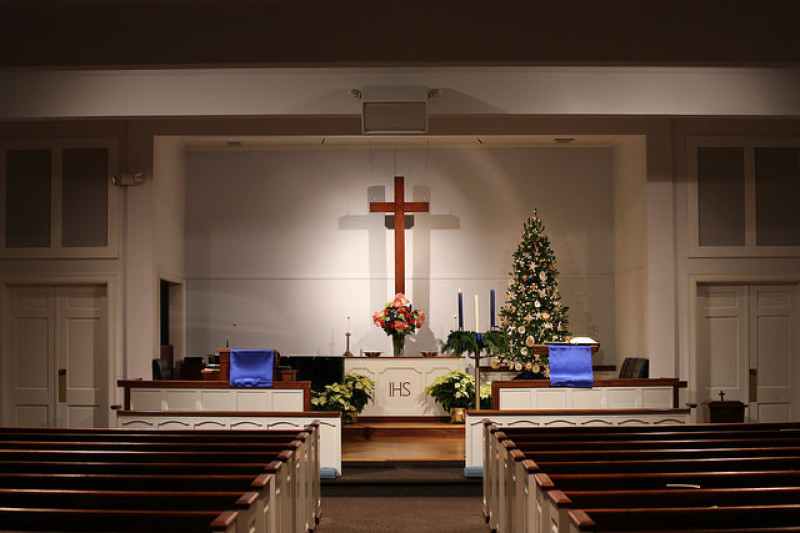
A church in Maine officially cuts ties with the United Methodist Church over deemed discrimination of the LGBTQ.
Reported by WGME-TV Channel 13, Members of HopeGateWay in Portland voted on March 28 to depart from the United Methodist Church. The group followed in the step of three other congregations who reportedly left last year.
Their reason is that they see the denomination's policies as too rigid in restricting LGBTQ people from participating in Christian rites like weddings and ministry ordination. Methodist pastors are forbidden to officiate same-sex weddings while gay people within the church could not be ordained as ministers.
The first to leave was the New Brackett Church, formerly called Brackett Memorial United Methodist Church followed by Chebeague Island UMC and the Tuttle Road UMC. The split, according to the report, was anticipated to be more accommodating to other people groups.
Ophelia Hu Kinney, a worship coordinator at HopeGateWay, said that she felt the United Methodist Church had "adopted policies that were discriminatory toward LGBTQ community members." These policies, she continued, were the reason why her church chose to renounce their affiliation with the Methodist denomination.
The dis-affiliation process requires the Maine church to explore and contemplate for eight months the impact of their decision as well as to assess their intent for leaving. Once they reached an agreement to officially disassociate from the United Methodist Church, the next step is to pay the denomination a reportedly "hundreds of thousands of dollar."
Rev. Sara Ewing-Merrill, the pastor of HopeGateWay, told the Portland news outlet that their church was required to pay $350,000 to the United Methodist Church as settlement. Still, she considered the price as worth it than remaining in a church that gate keeps the LGBTQ community.
While waiting for the final vote of their group's disaffiliation from UMC in June, HopeGateWay is reportedly working to rebuild their foundation as an independent faith group in Maine.
The "non-conformity" resolution
In 2016, the New England Conference passed a "non-conformity" resolution which was basically a pledge among its conference members to not practice policies that are non-inclusive of the LGBTQ community.
Come 2019, the denomination's church leaders from around the world convened at St. Louis to vote in another proposal called "traditional plan." The proposed plan was basically a redundancy of the denomination's stance on prohibiting same-sex unions and other provisions that will 'discriminate' against "self-avowed practicing homosexuals." The traditional plan got major support from the members.
HopeGateWay's member Hu Kinney commented that "the overwhelming sense in St. Louis was one of despair." She believes the move will only drive LGBTQ members away from practicing the Christian faith. That, according to her, was the breaking point for their church and other faith groups who are into 'affirming' and 'inclusivity.'
"It was refreshing and life-giving to be part of a church that focused on so much more," Hu Kinney told The Press Herald.
Rev. Will Green, the pastor of the New Brackett Church, also told the Herald that the United Methodist Church has been on" a trajectory to being more conservative" since the early 1970s.
"We find it's an offense to what we believe about God, about the community and about the world," he said. "The world is noticing the United Methodist Church is so anti-gay. We can put out our pride flags and try to create change, but at the end of the day we didn't belong in the United Methodist Church."
Stronger adherence to the Bible
The Maine congregation's decision to split and cut ties with the United Methodist Church is the complete opposite of what other Methodists did earlier this year. Whereas the above mentioned congregations decided to leave the denomination over its "rigid" views and stance on homosexuality and the LGBT, those who left earlier say they wanted a more traditional, Biblical view of the matter.
As per earlier reports, the group that left earlier, composed of conservative Methodists, are looking to form a new denomination seeking to adhere to Biblical views on the sexes. The new denomination, called Global Methodist Church, will not recognize same-sex marriage and unions and will have stronger bans on the ordination of LGBT people into ministry.
While the Global Methodist Church promises to the "ethnically and racially diverse," it will stick to a "traditional understanding of Christian marriage as God intended it to be," which means "a covenant between a man and a woman for human sexual expression."

























